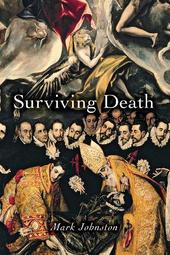
|
Surviving Death
Paperback / softback
Main Details
| Title |
Surviving Death
|
| Authors and Contributors |
By (author) Mark Johnston
|
| Series | Carl G. Hempel Lecture Series |
|---|
| Physical Properties |
| Format:Paperback / softback | | Pages:408 | | Dimensions(mm): Height 235,Width 152 |
|
| Category/Genre | Philosophy - epistemology and theory of knowledge
Theology |
|---|
| ISBN/Barcode |
9780691130132
|
| Classifications | Dewey:129 |
|---|
| Audience | | Tertiary Education (US: College) | | Professional & Vocational | |
|---|
| Illustrations |
2 line illus.
|
|
Publishing Details |
| Publisher |
Princeton University Press
|
| Imprint |
Princeton University Press
|
| Publication Date |
30 October 2011 |
| Publication Country |
United States
|
Description
In this extraordinary book, Mark Johnston sets out a new understanding of personal identity and the self, thereby providing a purely naturalistic account of surviving death. Death threatens our sense of the importance of goodness. The threat can be met if there is, as Socrates said, "something in death that is better for the good than for the bad." Yet, as Johnston shows, all existing theological conceptions of the afterlife are either incoherent or at odds with the workings of nature. These supernaturalist pictures of the rewards for goodness also obscure a striking consilience between the philosophical study of the self and an account of goodness common to Judaism, Christianity, Hinduism, and Buddhism: the good person is one who has undergone a kind of death of the self and who lives a life transformed by entering imaginatively into the lives of others, anticipating their needs and true interests. As a caretaker of humanity who finds his or her own death comparatively unimportant, the good person can see through death. But this is not all. Johnston's closely argued claims that there is no persisting self and that our identities are in a particular way "Protean" imply that the good survive death. Given the future-directed concern that defines true goodness, the good quite literally live on in the onward rush of humankind. Every time a baby is born a good person acquires a new face.
Author Biography
Mark Johnston is the Walter Cerf Professor of Philosophy at Princeton University and the author of "Saving God: Religion after Idolatry" (Princeton).
ReviewsHonorable Mention for the 2010 PROSE Award in Theology & Religious Studies, Association of American Publishers "[P]acked with illuminating philosophical reflection on the question of what we are, and what it is for us to persist over time--on the relations among selves, persons, human beings, bodies and souls."--Thomas Nagel, Times Literary Supplement "[Johnston] reveals himself to be an engaging wit, a swaggering polymath, and ... a major talent."--Jacques Berlinerblau, Chronicle of Higher Education "Surviving Death and Saving God both provided me with intellectual pleasure of a high order, even though I found many of the author's conclusions false and some morally repugnant. Johnston is the kind of atheist it's good for Christians to read, because he is intelligent, intellectually energetic, and serious about what he engages, and because he shows very clearly just where fastidiousness leads."--Paul J. Griffiths, Commonweal "Mark Johnston's Surviving Death is an immensely interesting book. While it is not without technical discussions of issues in philosophy of mind, philosophy of language, and personal identity, it is also a very readable book--and one that, despite some modest technicality, lets its author's personality shine through... Surviving Death is a provocative, engaging, and worthwhile book. It is certain to re-invigorate our thinking about the prospects that the good allows in relation to our mortality."--J. Jeremy Wisnewski, Philosophy in Review "[Surviving Death and Saving God] constitute a remarkably thorough and convincing treatment of two extremely important religious issues, those of the perennial allurements of idolatry and the deeply menacing fact of death, to say nothing of the books' endorsement and defense of an arduous but richly inspiring ideal of the religious life. The books are a welcome corrective for some of the most seductive and prevalent distortions of religious thought and practice. I heartily recommend them to the reader who relishes a bountifully laid, religiously nourishing, and deeply satisfying philosophical feast."--Donald A. Crosby, International Journal for Philosophy of Religion
|